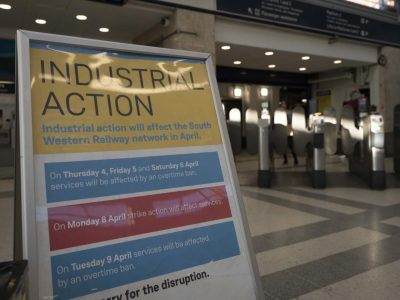As the latest bout of industrial action by train drivers gets under way, The Independent has uncovered an extraordinary rail fare anomaly – whereby a one-mile walk can save passengers £34, while some travellers may be paying over twice as much as they need.
Members of the Aslef union will be walking out on Friday 5 April at Avanti West Coast and others. On Saturday 6 April, the East Coast operator LNER will be one of the targets of the strikers; only a limited service will run on the link from Edinburgh, Newcastle and York to London King’s Cross.
As a result, many Scottish travellers are seeking alternative routes from Edinburgh to London. But some risk paying much more than they need due to the bizarre fares structure between the Scottish and English capitals.
Anyone searching for a Saturday morning train from Edinburgh Waverley to London King’s Cross on the LNER website is told that the cheapest fare is £200 one way. The state-owned train operator quotes only the “Anytime” fare, even though Saturday is an off-peak day.
The traveller will need to broaden the search to “London Terminals” to become aware of a direct train on Avanti West Coast from Edinburgh to London Euston, for which the fare is £125.
Yet even this is far more than passengers need to pay. The Avanti West Coast train stops at Haymarket station, just over one mile west of Edinburgh Waverley station. Passengers for London who board here pay only £91, saving £34 on the fare from the Scottish capital’s main station.
Stranger still, with that same £91 ticket they could instead board a train in the other direction, to Edinburgh Waverley, and connect to any of the London King’s Cross services currently showing as costing £200. Other passengers on the same train could be paying more than twice as much as they need.
Such an extreme anomaly on one of the UK’s key intercity links arises from the absurdities “baked in” during privatisation three decades ago – together with a pilot scheme on LNER of abolishing off-peak tickets on certain key journeys.
Earlier this year the state-run company said: “We’re piloting the removal of the complicated and outdated off-peak and super off-peak fares.”
As a result, LNER sells only Anytime, Advance and “70min Flex” tickets from Edinburgh, Berwick-upon-Tweed and Newcastle to London.
The 70min Flex is a variety of Advance tickets that allows passengers to switch to a train within 70 minutes. When Advance tickets are sold – as they almost all are on strike days – the only fare that shows from Edinburgh is a £200 one-way ticket.
The £125 fare from Edinburgh Waverley is restricted to Avanti West Coast’s route via Carlisle, Preston and Crewe to London. But the £91 ticket is a super off-peak ticket available for “any permitted route” – which includes Avanti West Coast plus LNER and other operators on the East Coast main line.
Travellers with super off-peak tickets can break their journey and opt for less-common routes – such as the Settle-Carlisle Railway across the Pennines – and could choose to pause in cities such as Sheffield or Oxford.
An LNER spokesperson said: “Reduced capacity because of strike action on Saturday means some services between Edinburgh Waverley and London King’s Cross have sold out. Approximately 90 per cent of the Standard Advanced tickets sold for that day were cheaper than the previously available Super Off-Peak fare.
“We continue to monitor our Simpler Fares pilot between Edinburgh, Newcastle and London and will make adjustments so that as many people as possible can access the right ticket at the right price for them.”
Mark Smith, the former British Rail manager who runs the Seat61.com website, said: “ LNER’s ‘Simpler Fares’ trial on the Edinburgh-London route has been bad news for passengers.
“The most important thing about it is knowing how to circumvent it. A flexible and refundable super off-peak fare still exists between Haymarket and London and is a far better deal than the restrictive and non-refundable Advance fares that have replaced the super off-peak on the Edinburgh-London flow, so buy from Haymarket instead.”
Mr Smith concluded: “One day, Britain may have sensible, logical rail fares, and it’ll make train travel so much easier and more attractive. But I wonder whether I’ll live long enough to see it?”











